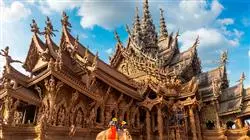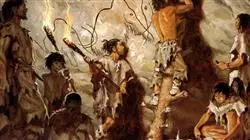University certificate
The world's largest faculty of humanities”
Why study at TECH?
Become an expert in Philosophy of Law or Religion, in a few weeks and without leaving home"

The study of philosophy, and cultural and artistic expression has always been one of the most useful, broad, and deep ways to learn about history, as well as about human beings and their thoughts and concerns. Through an exhaustive analysis, professionals in this area can extract a complete and clear vision, which is only possible with updated and accurate content and information on the subject.
This is the reason why TECH has created an Postgraduate diploma in Philosophy and Cultural Studies, to enhance the skills and optimize the accuracy of the knowledge of those students who are interested in updating their knowledge in this field. Therefore, this program deals with topics such as the Nature of Legal Activity, the Reality and Transcendence of the Sacred, the principles of the Social and Political Order or the Philosophy of Knowledge, among others.
All this, thanks to a 100% online modality that allows students to organize their studies and schedules with total freedom. In addition, thanks to the latest content and the most complete additional and practical materials, with which to acquire the necessary skills and competencies.
Delve into topics such as Philosophical Theology or the Essence of Religion and stand out for your knowledge in this sector"
This Postgraduate diploma in Philosophy and Cultural Studies contains the most complete and up-to-date program on the market. The most important features include:
- Practical cases presented by experts in Aesthetics and Cultural Studies
- The graphic, schematic, and practical contents with which they are created, provide practical information on the disciplines that are essential for professional practice
- Practical exercises where self-assessment can be used to improve learning.
- Its special emphasis on innovative methodologies
- Theoretical lessons, questions to the expert, debate forums on controversial topics, and individual reflection assignments
- Content that is accessible from any fixed or portable device with an Internet connection
Expand your knowledge in Social and Political Philosophy, with a 100% online program that gives you total freedom of organization"
The program’s teaching staff includes professionals from the field who contribute their work experience to this educational program, as well as renowned specialists from leading societies and prestigious universities.
The multimedia content, developed with the latest educational technology, will provide the professional with situated and contextual learning, i.e., a simulated environment that will provide immersive education programmed to learn in real situations.
This program is designed around Problem-Based Learning, whereby the professional must try to solve the different professional practice situations that arise during the academic year For this purpose, the students will be assisted by an innovative interactive video system created by renowned and experienced experts.
A unique and completely innovative opportunity to achieve your most demanding goals in the field of Philosophy"

The fastest and most up-to-date way to enhance your skills in Philosophy and Cultural Studies"
Syllabus
The structure and content of this program have been designed by the renowned professionals that make up TECH's prestigious team of experts in Philosophy and under the pedagogical methodology of Relearning, which guarantees that students can face their studies and assimilate the concepts in a natural, precise and agile way, without the need to dedicate excessive hours to the syllabus. All this, with materials of the highest quality.

A syllabus designed for you and created by renowned experts in Philosophy, with outstanding professional careers"
Module 1. Legal Philosophy
1.1. Introduction
1.1.1. The Nature of Legal Activity
1.1.2. Common Legal Knowledge
1.1.3. Technical Legal Knowledge
1.1.4. Division of Law
1.1.5. Legal Methodology
1.1.6. Relation of Law with Other Forms of Knowledge
1.2. Main Points in Legal Knowledge
1.2.1. Fairness in the Area of Commutative Law
1.2.2. Fairness in the Distributive Sphere
1.2.3. Forality
1.3. The History of Law
1.3.1. The Ius in Archaic Rome
1.3.2. The Lus Civile and Lex Antiqua Binomial
1.3.3. The Ius in the Christianized Greek East
1.3.4. The Ius in the Christianized Latin West
1.3.5. The Protestant Rupture
1.3.6. The New Revolutionary Order
1.4. Law and Theology
1.4.1. Ancient Ius as Pagan Theologia Civilis
1.4.2. The Jurist and the Staretz
1.4.3. Restitution and Penance
1.4.4. Justice and Mercy
Module 2. Religious Philosophy
2.1. Sources of Religious Fact
2.1.1. Religious Fact
2.1.2. Typologies of Historical Religions
2.1.3. Religions Through History
2.1.4. Oppression and Rejection of Religion
2.2. Reality and Transcendence of the Sacred
2.2.1. Phenomenological Analysis of Religious Experience
2.2.2. The Names of the Sacred
2.2.3. The Dimension of Reality in the Sacred
2.2.4. The Dimension of Transcendence in the Sacred
2.2.5. The Dimension of Mystery in the Divine
2.3. Personal Character and the Salvation of Divinity
2.3.1. The Personal Dimension of the Divine
2.3.2. The Dimension of the Sacred, Holiness, Sanctity and Salvation of the Sacred
2.4. The Interiority of Religious Experience
2.4.1. The Subjective Aspect of the Faith Experience
2.4.2. Religious Experience: Fear and Love
2.4.3. The Psychic Structure of Religious Experience
2.4.4. The Corporeal and Communal Dimensions of Religion
2.5. External Manifestation of Religious Experience
2.5.1. The Externalization of Acts of Faith
2.5.2. The Noetic and Cultural Levels of Religious Experience
2.5.3. The Fundamental Acts of Religious Experience
2.5.4. The Corporeal and Communal Dimensions of Religion
2.6. The Essence of Religion
2.6.1. A Retrospective View
2.6.2. What Religion Is Not
2.6.3. What Religion Is
2.6.4. Conclusions
Module 3. Social and Political Philosophy
3.1. Examples of Philosophical Reflections on Society and Politics
3.1.1. Ancient and Medieval Philosophers
3.1.2. Modern and Contemporary Philosophers
3.2. Principles of Social and Political Order
3.2.1. Human Person and Law: Person and Freedom. Marriage. Family
3.2.2. Law and Legality: Solidarity. Subsidiarity. Common Good. Society
3.2.3. Economics and Development: Intermediate Bodies. Social Participation. Work
3.3. The State and Social Constitution
3.3.1. Nature and Constitution of the State: Definition. Law. Authority. Power. Territory. Nation and Homeland. Autonomy. Sovereignty
3.3.2. Bodies, Limits and Functions of the State: Division of Power. Legitimacy and Legality. International Community
3.3.3. Forms of Government: Democracy and Other Forms of Political Organization. Autonomy. Sovereignty
3.4. Justice and Peace
3.4.1. Poverty, Development and Relationships of Justice
3.4.2. Promoting Peace and International Community: Global Entities
3.4.3. War and Conditions for Peace: Legitimate Defence and Community
Module 4. Philosophical Synthesis
4.1. Metaphysics
4.1.1. The Nature of Metaphysics
4.1.2. The Dynamism of Being
4.1.3. Casual Dynamism
4.1.4. The Statics of Being
4.1.5. The Transcendental Properties of Being
4.1.6. The Classification of Being
4.1.7. The Participation and Analogy of Being
4.2. Philosophy of Nature
4.2.1. The Nature of the Treaty
4.2.2. The Intelligibility of Nature
4.2.3. The Structure of Nature
4.2.4. The Origin and Meaning of Nature
4.3. Philosophical Anthropology
4.3.1. The Nature of Philosophical Anthropology
4.3.2. Human Life
4.3.3. The Phenomenology of Human Behavior
4.3.4. Human Knowledge
4.3.5. Human Desire
4.3.6. Human Affectivity
4.3.7. Human Unity and Dualism
4.3.8. Humans as Personal Beings
4.3.9. Dimensions of the Personal Being
4.3.10. Death and Human Transcendence
4.4. Philosophy of Knowledge
4.4.1. The Nature of Philosophy of Knowledge
4.4.2. Fundamental Perspectives in Epistemology
4.4.3. Knowledge in General
4.4.4. Perceptual Knowledge
4.4.5. Intellectual Knowledge
4.4.6. Functions, Acts and Areas of Intellectual Knowledge
4.4.7. The Truth of Knowledge and Its Discernment
4.5. Ethics
4.5.1. The Nature of Ethics
4.5.2. Human Goodness
4.5.3. The Moral Subject
4.5.4. Moral Law
4.5.5. Moral Conscience
4.5.6. Friendship Communities
4.5.7. Matters in Bioethics
4.5.8. Human Work
4.5.9. Political Society
4.6. Philosophical Theology
4.6.1. The Nature of Philosophical Theology
4.6.2. God as a Problem
4.6.3. The Existence of God
4.6.4. The Essence of God
4.6.5. God and the World
4.6.6. God and Humans
4.7. Synthetic Vision
4.7.1. Thematic and Argumentative Linking of Treaties
4.7.2. Toward a Global Vision and Harmonic Reality

A fully up-to-date program, with the most relevant and essential aspects organized in a dynamic and structured way”
Postgraduate Diploma in Philosophy and Cultural Studies
Enter the fascinating world of philosophy and cultural studies with the Postgraduate Diploma program at TECH Global University. Through our online classes, you'll be able to explore history's most influential ideas, analyze contemporary cultural phenomena and develop a unique critical perspective. In the Philosophy and Cultural Studies graduate program, you will have the opportunity to study from the comfort of your home, adapting your schedule to your daily responsibilities. Our innovative approach to online classes allows you to access quality content, interact with expert faculty and connect with peers from around the world, learning from philosophy's own critical reflection. The program addresses a wide range of topics, from the foundations of philosophy to contemporary challenges in culture. You will explore the main philosophical currents, such as existentialism, positivism and critical thinking, and understand their impact on our understanding of the world. In addition, you will analyze current cultural phenomena, such as multiculturalism, globalization and the media, and examine how they influence society and the construction of individual and collective identities. With the tools exposed above you will be able to have a critical perspective on the facts that transform a society and the role of philosophy.
Take the reins of your professional career with this particular Postgraduate Diploma
The program is based on an interdisciplinary approach, combining philosophy with cultural studies to give you a comprehensive understanding of the complexities of the contemporary world. Through online discussions and research projects, you will develop analytical and critical thinking skills that will prepare you to meet today's intellectual and professional challenges. Enroll in TECH Global University's Postgraduate Diploma in Philosophy and Cultural Studies program and expand your intellectual horizons. Discover new perspectives, challenge your ideas and become a critical and creative thinker. Advance your journey toward knowledge and reflection today!







